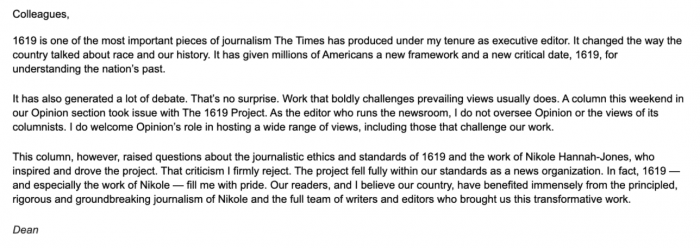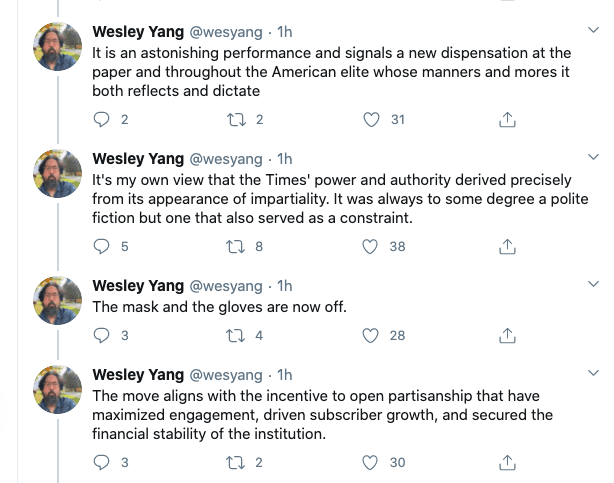News From Walter Duranty’s Paper

You might have missed Bret Stephens’s evisceration, in the pages of The New York Times, of The 1619 Project. It was respectful, in the sense that a pious gourmand prays over his meal before he devours it. Excerpts:
Journalists are, most often, in the business of writing the first rough draft of history, not trying to have the last word on it. We are best when we try to tell truths with a lowercase t, following evidence in directions unseen, not the capital-T truth of a pre-established narrative in which inconvenient facts get discarded. And we’re supposed to report and comment on the political and cultural issues of the day, not become the issue itself.
As fresh concerns make clear, on these points — and for all of its virtues, buzz, spinoffs and a Pulitzer Prize — the 1619 Project has failed.
More:
These two flaws led to a third, conceptual, error. “Out of slavery — and the anti-Black racism it required — grew nearly everything that has truly made America exceptional,” writes Silverstein.
Nearly everything? What about, say, the ideas contained by the First Amendment? Or the spirit of openness that brought millions of immigrants through places like Ellis Island? Or the enlightened worldview of the Marshall Plan and the Berlin airlift? Or the spirit of scientific genius and discovery exemplified by the polio vaccine and the moon landing? On the opposite side of the moral ledger, to what extent does anti-Black racism figure in American disgraces such as the brutalization of Native Americans, the Chinese Exclusion Act or the internment of Japanese-Americans in World War II?
Monocausality — whether it’s the clash of economic classes, the hidden hand of the market, or white supremacy and its consequences — has always been a seductive way of looking at the world. It has always been a simplistic one, too. The world is complex. So are people and their motives. The job of journalism is to take account of that complexity, not simplify it out of existence through the adoption of some ideological orthodoxy.
This mistake goes far to explain the 1619 Project’s subsequent scholarly and journalistic entanglements. It should have been enough to make strong yet nuanced claims about the role of slavery and racism in American history. Instead, it issued categorical and totalizing assertions that are difficult to defend on close examination.
It should have been enough for the project to serve as curator for a range of erudite and interesting voices, with ample room for contrary takes. Instead, virtually every writer in the project seems to sing from the same song sheet, alienating other potential supporters of the project and polarizing national debate.
Stephens says, “The 1619 Project is a thesis in search of evidence, not the other way around,” and concludes, “Through its overreach, the 1619 Project has given critics of The Times a gift.”
Read it all. It was a thorough repudiation of the celebrated project. Given the Jacobin atmosphere in the Times newsroom, Stephens has real stones to write that, and so does whoever runs the editorial page these days for running it. Someone, can’t remember who, said on Twitter that Times publisher A.G. Sulzberger must have been really pissed off over the criticism of The 1619 Project if he signed off on such a rebuke in the pages of the paper. Maybe. He ought to be. The 1619 Project, as Stephens proves, was nothing but left-wing agitprop.
Well. Today Times executive editor Dean Baquet came out swinging on behalf of Nikole Hannah-Jones, the Pulitzer Prize-winning matriarch of the project, issuing this statement:

“Work that boldly challenges prevailing views”? Please. The 1619 Project says exactly what America’s liberal and corporate elites want to hear. Besides, if the Times published an editorial package claiming space aliens built the pyramids, that would be boldly challenging prevailing views too (but the National Enquirer beat them to the story in the 1970s).
Baquet must have been under enormous pressure to make that statement. But it comes at a cost to his reputation. The essayist Wesley Yang tweeted:

Yep. The 1619 Project tells an ideologically appealing falsehood. It’s corrupting. And it’s a sign of decline towards something nasty. As I write in Live Not By Lies, Hannah Arendt saw this kind of thing — propaganda, and the willingness to believe useful lies — as a bellwether of totalitarianism:
Heda Margolius Kovály, a disillusioned Czech communist whose husband was executed after a 1952 show trial, reflects on the willingness of people to turn their backs on the truth for the sake of an ideological cause.
It is not hard for a totalitarian regime to keep people ignorant. Once you relinquish your freedom for the sake of “understood necessity,” for Party discipline, for conformity with the regime, for the greatness and glory of the Fatherland, or for any of the substitutes that are so convincingly offered, you cede your claim to the truth. Slowly, drop by drop, your life begins to ooze away just as surely as if you had slashed your wrists; you have voluntarily condemned yourself to helplessness.
You can surrender your moral responsibility to be honest out of misplaced idealism. You can also surrender it by hating others more than you love truth. In pre-totalitarian states, Arendt writes, hating “respectable society” was so narcotic, that elites were willing to accept “monstrous forgeries in historiography” for the sake of striking back at those who, in their view, had “excluded the underprivileged and oppressed from the memory of mankind.”
For example, many who didn’t really accept Marx’s revisionist take on history—that it is a manifestation of class struggle—were willing to affirm it because it was a useful tool to punish those they despised.
Here’s an important example of this happening in our time and place. In 2019, The New York Times, the world’s most influential newspaper, launched the “1619 Project,” a massive attempt to “reframe” (the Times’s word) American history by displacing the 1776 Declaration of Independence as the traditional founding of the United States, replacing it with the year the first African slaves arrived in North America.
No serious person denies the importance of slavery in US history. But that’s not the point of the 1619 Project. Its goal is to revise America’s national identity by making race hatred central to the nation’s foundational myth. Despite the project’s core claim (that the patriots fought the American Revolution to preserve slavery) having been thoroughly debunked, journalism’s elite saw fit to award the project’s director a Pulitzer Prize for her contribution.
Equipped with this matchless imprimatur of establishment respectability, the 1619 Project, which has already been taught in forty-five hundred classrooms,16 will find its way into many more.
Dean Baquet was faced with a powerful argument by one of his newspaper’s own columnists, revealing without a shadow of a doubt that The 1619 Project was based on a lie — but he still defended it. The mask and gloves really are off at Mr. Duranty’s paper.
Subscribe for as little as $5/mo to start commenting on Rod’s blog.